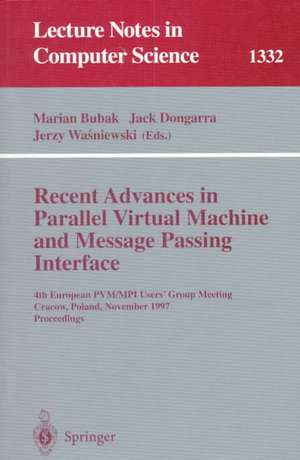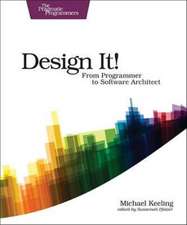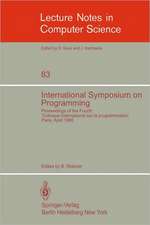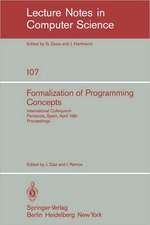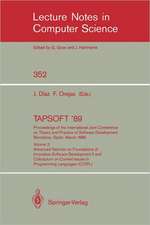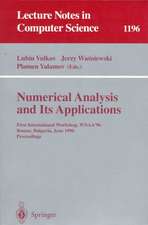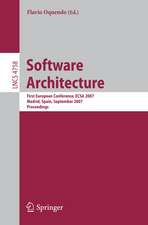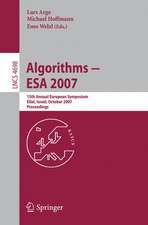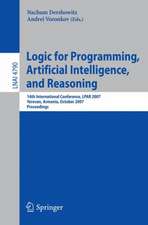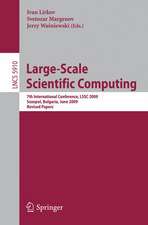Recent Advances in Parallel Virtual Machine and Message Passing Interface: 4th European PVM/MPI User's Group Meeting Cracow, Poland, November 3-5, 1997, Proceedings: Lecture Notes in Computer Science, cartea 1332
Editat de Marian Bubak, Jack Dongarra, Jerzy Wasniewskien Limba Engleză Paperback – 15 oct 1997
Parallel Virtual Machine and Message Passing Interface are the most popular tools for programming in accordance with the message passing paradigm which, at present, is considered to be the best way to develop effective parallel programs.
The book presents 63 carefully selected papers covering the whole range of PVM/MPI issues. The papers are organized in sections on evaluation and performance, extensions and improvements, implementation, tools, algorithms, and applications in science and engineering.
Din seria Lecture Notes in Computer Science
- 20%
 Preț: 1061.55 lei
Preț: 1061.55 lei - 20%
 Preț: 307.71 lei
Preț: 307.71 lei - 20%
 Preț: 438.69 lei
Preț: 438.69 lei - 20%
 Preț: 645.28 lei
Preț: 645.28 lei -
 Preț: 410.88 lei
Preț: 410.88 lei - 15%
 Preț: 580.46 lei
Preț: 580.46 lei - 17%
 Preț: 427.22 lei
Preț: 427.22 lei - 20%
 Preț: 596.46 lei
Preț: 596.46 lei -
 Preț: 449.57 lei
Preț: 449.57 lei - 20%
 Preț: 353.50 lei
Preț: 353.50 lei - 20%
 Preț: 1414.79 lei
Preț: 1414.79 lei - 20%
 Preț: 309.90 lei
Preț: 309.90 lei - 20%
 Preț: 583.40 lei
Preț: 583.40 lei - 20%
 Preț: 1075.26 lei
Preț: 1075.26 lei - 20%
 Preț: 310.26 lei
Preț: 310.26 lei - 20%
 Preț: 655.02 lei
Preț: 655.02 lei - 20%
 Preț: 580.93 lei
Preț: 580.93 lei - 20%
 Preț: 340.32 lei
Preț: 340.32 lei - 18%
 Preț: 938.83 lei
Preț: 938.83 lei - 20%
 Preț: 591.51 lei
Preț: 591.51 lei - 15%
 Preț: 438.59 lei
Preț: 438.59 lei - 20%
 Preț: 337.00 lei
Preț: 337.00 lei -
 Preț: 389.48 lei
Preț: 389.48 lei - 20%
 Preț: 607.39 lei
Preț: 607.39 lei - 20%
 Preț: 1024.44 lei
Preț: 1024.44 lei - 20%
 Preț: 579.30 lei
Preț: 579.30 lei - 20%
 Preț: 763.23 lei
Preț: 763.23 lei - 20%
 Preț: 453.32 lei
Preț: 453.32 lei - 20%
 Preț: 575.48 lei
Preț: 575.48 lei - 20%
 Preț: 585.88 lei
Preț: 585.88 lei - 20%
 Preț: 825.93 lei
Preț: 825.93 lei - 20%
 Preț: 763.23 lei
Preț: 763.23 lei - 17%
 Preț: 360.19 lei
Preț: 360.19 lei - 20%
 Preț: 1183.14 lei
Preț: 1183.14 lei - 20%
 Preț: 340.32 lei
Preț: 340.32 lei - 20%
 Preț: 504.57 lei
Preț: 504.57 lei - 20%
 Preț: 369.12 lei
Preț: 369.12 lei - 20%
 Preț: 583.40 lei
Preț: 583.40 lei - 20%
 Preț: 343.62 lei
Preț: 343.62 lei - 20%
 Preț: 350.21 lei
Preț: 350.21 lei - 20%
 Preț: 764.89 lei
Preț: 764.89 lei - 20%
 Preț: 583.40 lei
Preț: 583.40 lei - 20%
 Preț: 649.49 lei
Preț: 649.49 lei - 20%
 Preț: 341.95 lei
Preț: 341.95 lei - 20%
 Preț: 238.01 lei
Preț: 238.01 lei - 20%
 Preț: 538.29 lei
Preț: 538.29 lei
Preț: 344.42 lei
Preț vechi: 430.53 lei
-20% Nou
Puncte Express: 517
Preț estimativ în valută:
65.90€ • 68.99$ • 54.53£
65.90€ • 68.99$ • 54.53£
Carte tipărită la comandă
Livrare economică 05-19 aprilie
Preluare comenzi: 021 569.72.76
Specificații
ISBN-13: 9783540636977
ISBN-10: 3540636978
Pagini: 540
Ilustrații: XVII, 523 p.
Dimensiuni: 155 x 235 x 28 mm
Greutate: 0.75 kg
Ediția:1997
Editura: Springer Berlin, Heidelberg
Colecția Springer
Seria Lecture Notes in Computer Science
Locul publicării:Berlin, Heidelberg, Germany
ISBN-10: 3540636978
Pagini: 540
Ilustrații: XVII, 523 p.
Dimensiuni: 155 x 235 x 28 mm
Greutate: 0.75 kg
Ediția:1997
Editura: Springer Berlin, Heidelberg
Colecția Springer
Seria Lecture Notes in Computer Science
Locul publicării:Berlin, Heidelberg, Germany
Public țintă
ResearchCuprins
Why are PVM and MPI so different?.- Comparison of PVM and MPI performance in short-range molecular dynamics simulation.- Analyzing the performance of MPI in a cluster of workstations based on fast ethernet.- A comparison of MPI performance on different MPPs.- Predicting the performance of injection communication patterns on PVM.- Evaluation of the communication performance on a parallel processing system.- Evaluating personal high performance computing with PVM on Windows and LINUX environments.- Experimental evaluation of PVM group communication.- ARCH, an object oriented MPI-based library for asynchronous and loosely synchronous parallel system programming.- An extension to MPI for distributed computing on MPPs.- Distributed & cooperative applications in PVM.- Heterogeneous MPI application interoperation and process management under PVMPI.- YLC, A C++ Linda system on top of PVM.- Advanced capabilities in PVM 3.4.- Beyond PVM 3.4: What we've learned, what's next, and why.- Using PVM to build an interface to support Cooperative Work in a distributed systems environment.- Towards portable message passing in Java: Binding MPI.- Control activities in message passing environment.- Global semaphores in a parallel programming environment.- A synchronizing shared memory: Model and programming implementation.- Communication in multi-physics applications.- Embedding SCI into PVM.- Implementation of MPI on NEC's SX-4 multi-node architecture.- Breaking the curse of dynamics by task migration: Pilot experiments in the polder metacomputer.- PVM on the RHODOS distributed operating system.- A function to dynamic workload allocation in distributed applications.- Integrating PVaniM into WAMM for monitoring meta-applications.- Evaluation of parallel application's behavior in message passing environment.- Message-passing program development by ensemble.- Interaction patterns detection in PVM programs to support simulation.- The PALLAS parallel programming environment.- OMIS 2.0 — a universal interface for monitoring systems.- In quest of the bottleneck — monitoring parallel database systems.- Tools and auxiliary subsystems in PVM.- Debugging message passing programs using invisible message tags.- On the PVM/MPI computations of dynamic programming recurrences.- Parallel Branch and Bound algorithms for integer and mixed integer linear programming problems under PVM.- PVM-implementation of the PGC method with displacement decomposition.- Numerical integration on distributed-memory parallel systems.- PINEAPL: A European project on Parallel Industrial Numerical Applications and Portable Libraries.- Block-cyclic array redistribution on networks of workstations.- Performance of CAP-specified linear algebra algorithms.- Implementing parallel SBS-type linear solvers using ALWAN.- Highly parallel cryptographic attacks.- Implementation of some multiprocessor algorithms for ODES using PVM.- Parallel graph-partitioning using the mob heuristic.- Truncated block Newton and quasi-Newton methods for sparse systems of nonlinear equations. Experiments on parallel platforms.- An MPI driven parallelization strategy for different computing platforms: A case study.- Parallel version of a quantum classical molecular dynamics code for complex molecular and biomolecular systems.- Running large-scale air pollution models on message passing machines.- PVM experiences in developing the MIDAS parallel database system.- Developing non-local iterative parallel algorithms for GIS on Cray T3D using MPI.- Dynamic optimisation of a distributed VR system by network-balancing.-Molecular dynamics on hybrid memory machines.- Offering parallelism to a sequential database management system on a network of workstations using PVM.- Mixing simulations: Tracking strongly deforming fluid volumes in 3D flows.- Parallel crew scheduling on workstation networks using PVM.- MOPS — parallel environment for simulation of electronic circuits using physical models of semiconductor devices.- Message handling in parallel radiance.- Parallelization of neutron transport solvers.- Parallel rendering of radiance on distributed memory system by PVM.- Parallel turbulence simulation: Resolving the inertial subrange of Kolmogorov's spectra.
Textul de pe ultima copertă
This book constitutes the refereed proceedings of the 4th European Parallel Virtual Machine and Message Passing Interface Users' Group Meeting, PVM/MPI '97, held in Cracow, Poland in November 1997.
Parallel Virtual Machine and Message Passing Interface are the most popular tools for programming in accordance with the message passing paradigm which, at present, is considered to be the best way to develop effective parallel programs.
The book presents 63 carefully selected papers covering the whole range of PVM/MPI issues. The papers are organized in sections on evaluation and performance, extensions and improvements, implementation, tools, algorithms, and applications in science and engineering.
Parallel Virtual Machine and Message Passing Interface are the most popular tools for programming in accordance with the message passing paradigm which, at present, is considered to be the best way to develop effective parallel programs.
The book presents 63 carefully selected papers covering the whole range of PVM/MPI issues. The papers are organized in sections on evaluation and performance, extensions and improvements, implementation, tools, algorithms, and applications in science and engineering.
